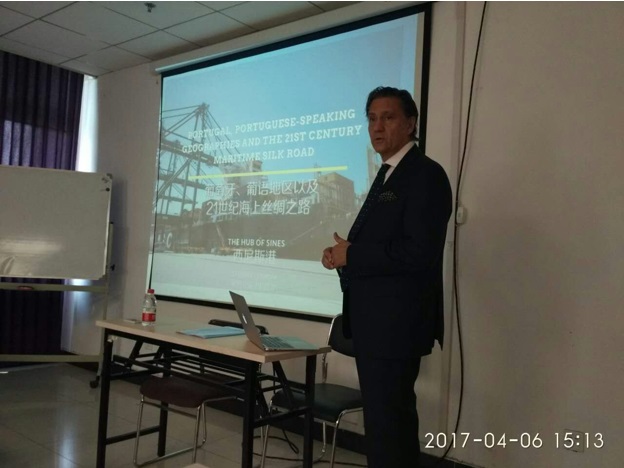Ambassador Talks – Portugal and the “21st Century Maritime Silk Road”
H.E. DR. JORGE TORRES-PEREIRA
AMBASSADOR OF PORTUGAL TO THE PEOPLE’S REPUBLIC OF CHINA
The honorable Jorge Torres-Pereira, Ambassador of Portugal to the People’s Republic of China, visited Tsinghua University on April 6, 2017 to deliver a lecture about Portugal and the “21st Century Maritime Silk Road”. The lecture was followed by a Q&A session. This was the 21st edition of the Tsinghua Ambassador Talks, beginning a new series of talks with speakers from Portuguese speaking countries.
Ambassador Torres-Pereira started the session illustrating the long history the Portuguese have had with navigation. This history goes back to the 15th and 16th century when the Portuguese ships had already began making voyages to and from South America, Africa and Asia. These long maritime roads helped to connect different parts of the globe, from China to the new lands in the American continent. At present, Portugal preserves its relevance as an important maritime player, particularly by its harbors, which are important trade hubs in Europe.
The Port of Sines is of particular note. The Ambassador mentioned that the port’s large capacity allows for the movement of different types of goods, which are linked to critical railroad networks that connect Portugal to greater Europe. These and other characteristics are extremely valuable in increasing the relevance of Portugal as a maritime player. Mr. Torres-Pereira made a point to stress, Portugal’s willingness to partner with China on One Belt One Road will not only strengthen Portugal’s maritime prowess, but will be an economic boon for China and the EU as well.
Following the argument for continued Sino-Portuguese cooperation, the Ambassador went on to discuss how the expertise of Portuguese companies are helping to grow the renewable energy sector. The focus here was a company known as EDP, which is currently one of the world’s largest energy operators. EDP currently operates on several different continents and has decades of experience in the energy sector. As such is seeking to create “win-win” partnerships with Chinese businesses operating both domestically and abroad.
The talk ended with a discussion about education. The Ambassador observed that there has been a steady increase in the demand by Chinese students interested in learning Portuguese. This is best illustrated by the large number of Chinese universities currently offering Portuguese as a degree. Presently, there are around 30. Recognizing this trend, the Portuguese Embassy in partnership with Portuguese educational institutions decided to create the “Prêmio Tomás Pereira”, a scholarship for Chinese students who demonstrate a high proficiency level in Portuguese. The grant is a scholarship to study Portuguese in Portugal for a summer or an intensive course.


